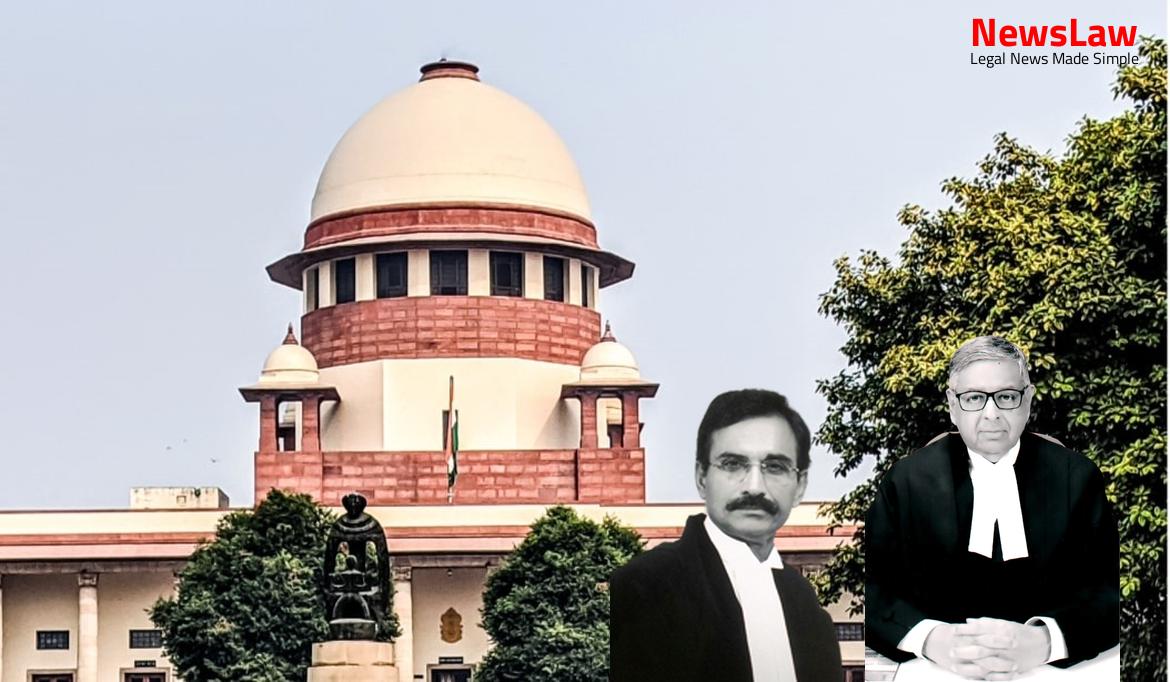Delve into the complexities of a legal case surrounding a property auction and the authority of Municipal Committees. The court’s detailed examination of the auction confirmation process, legal possession rights, and the implications of invalid laws brings to light crucial aspects of property transactions and municipal governance.
Facts
- Plaintiff claimed to be a bonafide purchaser in possession of the suit land after participating in an auction.
- The auction was conducted by the Sub-Divisional Officer, Hisar, at a rate of Rs.2,32,000/- per acre after sanction was granted in 1995.
- Municipal Committee admitted property was auctioned after permission from the Deputy Commissioner, but lacked approval from the State Government.
- Plaintiff sought execution of a sale deed based on a resolution passed by the Municipal Committee in 2002.
- Civil suit for mandatory injunction filed by the plaintiff after serving a registered notice in 2006.
- The Municipal Committee’s appeals were dismissed, and the sale deed execution remains pending.
- The trial court decreed the suit on 9.3.2016 after giving findings on the issues framed.
- The appeals filed by the Municipal Committee were dismissed.
- The counsel for the plaintiff was informed about the Full Bench judgment of Punjab & Haryana High Court declaring the 1974 Act as illegal.
- The vesting of land to shamilat deh based on the 1974 Act was deemed not tenable.
Also Read: Landmark Judgment on Compensation for Fatal Accident
Arguments
- Approval of sale of property by public auction does not confirm the auction until confirmed by the State Government.
- Plaintiff’s reliance on the Haryana Municipal Common Lands (Regulation) Act, 1974, and related rules was deemed invalid due to the Act being declared unconstitutional by the High Court.
- Mere status as the highest bidder does not grant the plaintiff legal rights until confirmation of the auction and issuance of the acceptance letter.
- Plaintiff’s possession of the property was labeled as unauthorized and illegal until confirmation of the sale.
- The property was put to auction after previous approval of the Deputy Commissioner
- The sale was confirmed later via Ex.P/34
- The plaintiff was found to be the highest bidder and the sale was confirmed by the Deputy Commissioner
- The plaintiff was rightly granted a decree for a mandatory injunction
- The property did not vest with the Municipality under the 1974 Act
Also Read: Land Acquisition Compensation Analysis
Analysis
- The letter seeking approval of the State Government by the Deputy Commissioner is not the approval granted by him, hence cannot be enforced in court.
- Section 245 of the 1973 Act empowers the Deputy Commissioner to carry out assigned functions.
- The suit was not maintainable as there was no concluded contract that came into force.
- The suit for mandatory injunction was filed beyond the limitation period of three years after the auction was conducted.
- The Deputy Commissioner was bound to seek approval of the State Government as per Section 250 of the 1973 Act.
- Actions taken by the Deputy Commissioner need to be reported to the Commissioner.
- Merely writing something on the file does not amount to an order.
- A letter does not record the decision of the Central Government under Section 33 of the Displaced Persons (Compensation and Rehabilitation) Act 1954.
- A noting recorded in the file is merely a noting simpliciter and nothing more; it represents an expression of opinion by the individual.
- The State or authority which can be held to be a State within the meaning of Article 12 of the Constitution is not bound to accept the highest tender or bid.
- The High Court was in error in assuming a final decision had been taken and quashing an inter-departmental communication that was just a step in the process of taking a final decision by the Government.
- Section 61(1)(h) of the 1973 Act is under challenge in another case before the Court.
- Sections (a) to (g) except clause (f) of Section 61 deal with public utility services.
- Clause (f) of Section 61 deals with the utilization of land or property transferred or acquired by the Committee for local public purposes.
- Section 62 of the 1973 Act mandates the Municipal Committee to maintain an inventory and map of all immovable property it owns, vests in it, or holds in trust for the State Government.
- A court direction couldn’t have been granted in the absence of clarity on whether the land in question was owned by the Municipality or not.
- It is not clear whether the land in question was listed in the inventories of the Municipal Committee’s properties.
- The Municipal Committee has been found lacking in defending its property as a custodian of public property.
- Plaintiff was granted decree for mandatory injunction beyond the period of limitation
- Decree was granted in contravention of the statute and rules framed thereunder
Also Read: Judicial Review of Search and Seizure Authorization
Decision
- Judgment and decree of the courts below are set aside.
- An amount of Rs.15,76,150/- to be forfeited towards damages for illegal occupation of the land for more than 20 years.
- Municipality to take possession of the land immediately.
- Municipality to furnish compliance report within three months.
- Plaintiff found to be in illegal possession without authority of law.
- Appeal is allowed.
Case Title: MUNICIPAL COMMITTEE BARWALA SECRETARY/PRESIDENT Vs. JAI NARAYAN AND COMPANY (2022 INSC 361)
Case Number: C.A. No.-002222-002222 / 2022



